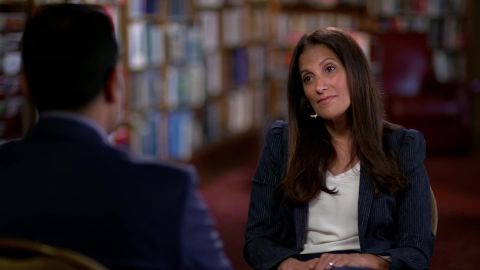Read Transcript EXPAND
CHRISTIANE AMANPOUR: Why did you think now was the time to revisit this figure?
BRENDAN SIMMS, AUTHOR, “HITLER: A GLOBAL BIOGRAPHY”: Well, because I think that the American dimension through his thoughts has been completely overlooked. I think the question of migration, which is now obviously very current is central to his thinking. And I think that international capitalism is a world view, which was something that he challenged, is also very much under threat today.
AMANPOUR: So, just describe that. When you say the American dimension to his thinking, what did you mean?
SIMMS: Well, Hitler was exercised by the fact that the German rise, German empire couldn’t feed his population in the 19th century. And many of the millions of them immigrated mostly to the United States. And Hitler was very worried that they came back as enemy soldiers in times of world war. And I quote an incident which has not been spotted any of his biographers before, which is his encounter in July 1918 with the first American prisoners. And later in the 1920s, he says, these are all blond blue-eyed German — either German immigrants or the sons of German immigrants. And so, these are people we’ve exported for decades and now, they’re coming back to fight us. So, it’s a trauma for him and that’s what then drives his quest for living space in the East. He says, we need space like the Americans have and then we won’t need to export our population.
AMANPOUR: So, you know, one of the headlines that described your theory as a provocative departure is that Hitler was obsessed by the danger, in his view, of Anglo-American capitalism even more than what history has generally thought was his big fear of Soviet communism.
SIMMS: That’s correct. In fact, he saw Soviet communism and Bolshevism as a subordinate threat. He was obviously very concerned but he saw communism as an instrument that international capitalism used to break down successful national economies. So, his analysis of German’s predicament was that Germany had a successful national economy but that’s the powers of international capital by which he meant both Jews and non-Jews, so people like J.P. Morgan, for instance, really the captains, the lords of industry and the lords of capital in Wall Street and in London, that they were jealous of the German rise and therefore, you know, subjugated it in the first World War and then put various subversive elements like trade unions or like communists on to disrupt Germany internally
About This Episode EXPAND
Religion scholar Karen Armstrong sits down with Christiane Amanpour to tell her amazing life journey from religious nun to secular scripture expert. Brendan Simms explains how Adolf Hitler came to power and the lessons we can learn from it. President of StubHub Sukhinder Singh Cassidy joins Hari to discuss diversity in tech and theBoardlist, the talent recruitment forum she founded.
LEARN MORE


